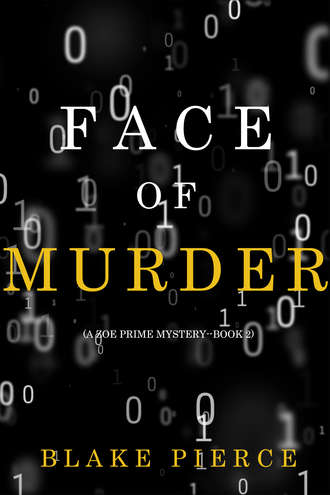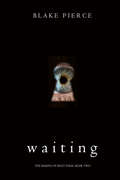
Блейк Пирс
Face of Murder
CHAPTER TWENTY TWO
Zoe let go of her seatbelt and breathed out slowly, trying to re-center herself.
“Sorry,” John said. “I tried to drive smoothly, but it sounded like time was of the essence.”
“It was,” Zoe said, opening the passenger’s side door. “It is. I get carsick no matter what. Thank you for the ride.”
She got out and shut the door behind her, her obligations of politeness toward John now completely forgotten. There was something more pressing to think about: figuring out who the serial killer stalking Georgetown really was, and clearing Dr. Applewhite’s name.
Zoe strode across smooth flooring laid out in predictable tile patterns, upset at ugly points by the placement of a chair or a desk in an inappropriate place that messed up the lines, passing the waiting area without seeing Shelley. Her home was much farther away than the cocktail bar had been. Zoe figured she wouldn’t arrive for a while yet. There was no time to sit around and wait for her.
“Neurology department?” she barked at the reception desk. She had been in enough hospitals across the country, visiting victims and taking statements, to know that they were often mazelike and impossible to predict unless you knew the entire history of the building. Maybe it made sense that cardiology should be next to the pediatric ward if you knew that the departments had received funding one after the other for new extensions to the building, but no sane person would have built them like that on purpose. It didn’t help that the plane symmetry was thrown off by refurbishments that cut across old tiles, hurting Zoe’s eyes and making it all the more confusing.
The woman behind the desk was, like almost all receptionists Zoe had ever come across, slow and supercilious. On top of that, she had to weigh a hundred and eighty-five pounds, and she was pushing sixty. She raised eyebrows from behind glasses slid low on her nose, and looked Zoe up and down. “Are you a patient or a visitor?”
“Neither. Where is it?” Zoe hated moments like this, the delay of small-minded people. There seemed to be so many of them in the world, totally unfazed by the concept of efficiency or practicality.
“If you are a patient, you have to sign in at the touchscreen here and wait for your name to be called before you go the neurology department,” the receptionist was saying, pointing a lazy, fat wrist in the direction of the device. “If you are a visitor, you need to collect a visitor’s pass and give the name of the person you are here to see. Visiting hours are over, however, so visitor’s passes are not currently available. If you are neither of those things, you will have to leave this hospital.”
Zoe rolled her eyes and yanked her badge out of her pocket, slamming it down on the desk in front of the receptionist. “I can go wherever I like in this hospital,” she hissed, delivering a glower that she hoped would do the desired job of making this woman do her damn job. “Now, tell me the quickest way to get to the neurology department.”
The receptionist made a show of studying the badge, lifting her glasses up by the arm to push them closer to her eyes as she squinted. “Well, Agent,” she began, as slow as was humanly possible, “you first take the second right, then you will need to go up in the elevator to the third floor. Turn left twice at your earliest opportunities, and then take the third right, and you will be at the neurology waiting area.”
Zoe snatched her badge back, already beginning to turn away. “Another special agent is coming. Tell her where to find me,” she shot over her shoulder, not bothering to wait to see if the woman would agree.
She would agree, or Zoe would have her up on charges of obstructing justice. She was not in the mood to be messed around with today.
The directions might have been confusing for someone who did not easily grasp patterns and numbers, but Zoe had laid out a miniature map in her mind even as the woman was speaking. Ignore the first right, then turn, then up and up. She tapped her foot restlessly as the elevator traveled slowly and smoothly, designed not to be uncomfortable for those in need of medical attention. A doctor in whites and two other visitors eyed her strangely, no doubt picking up on her impatience. Now that Zoe had the answer within her grasp, she wanted it as soon as possible. She wanted it five minutes ago. All of this had to end, and now.
The elevator dinged, the doors slid open, and Zoe was shouldering her way out of them almost before there was enough room for her to get through. Left, left, skip two and then right—and there it was. A small and modest sign printed on blue plastic hung above the doorway, declaring this to be the Neurology Department.
And below it, just beyond the doors, another reception desk—with another woman approaching retirement age, another victim of a few too many donuts.
Zoe felt her heart sink, but she pressed on. At least there was someone to talk to. She would need to talk to someone, after all, if she was going to get her hands on the patient records.
This time, she did not waste minutes asking questions that were not going to be answered. She lifted her badge as she approached and then placed it down on the desk in case the woman would want to examine it. “Special Agent Zoe Prime. I need to see this department’s patient records. What kind of search functions do you have available on your database?”
The receptionist stared at her and blinked. Her hair was tinged gray at the very top only. She must have dyed the rest, maybe recently made a decision to stop and let it grow out. She glanced down and read the badge, verifying that it was real, before looking up expectantly. “May I see the warrant?”
Zoe paused.
Ah.
The one thing she did not have.
Truth be told, she had let all thoughts of procedure fly out of her head. Call it a side effect of the alcohol, call it sheer excitement at the thought that she might be able to clear Dr. Applewhite. Whatever it was, she had only thought about reading the records themselves—not about how she was going to do that.
“There is no time to get a warrant. This is extremely urgent. I need to find a person fitting a particular neurological profile.”
The receptionist narrowed her eyes and leaned back in her chair, folding her arms across her chest. “You mean to tell me that you don’t even have a warrant?”
Zoe didn’t need to have the ability to read nuance and subtlety of tone and gesture to know that this was not going well. “This is extremely important. You have heard of the murders on campus?”
“I heard about them,” the receptionist agreed, shrugging her meaty shoulders up and down. “But I can’t help you, sister. You need to come back when you have a warrant. That’s how the law works.”
Zoe covered her face with her hands for a moment, trying to think of a way to explain this to the woman without biting her head off. “Look, you do not understand.”
“I understand fine enough.” The receptionist shook her head resolutely, turning her attention back to her computer screen. “No warrant, no access.”
“Zoe?”
Zoe turned, grateful to see Shelley approaching them fast. Her hair was slightly mussed, her makeup not quite as neat as usual. Zoe figured Shelley must have already been getting ready for bed when she called.
“She will not let me see the records,” Zoe said, setting her mouth in a firm line of displeasure.
“Without a warrant, right?” Shelley nodded, looking between Zoe and the receptionist as she arrived next to them. She took a breath, perhaps assessing the situation, before continuing. “May I speak with the administrator? Just to discuss further. We might need to schedule a visit.”
“No, we need to see the records now,” Zoe hissed, trying to get Shelley’s attention.
Shelley looked up at her, giving her an odd tilt of the head and raise of the eyebrows that Zoe could not decipher. “Let’s just talk to the administrator and see what’s possible. At least that way we can expedite the process.”
The receptionist made a face, eyebrows high and eyes sliding off to the side. “I’ll give him a call. But I would be surprised if he’s still in this late.”
The phone rang for eight seconds before someone on the other end answered. The receptionist could not contain the shock on her face as she spoke to them, explaining the situation. Zoe did not even try to contain her own spiteful glee when she put the receiver down and invited them to wait in the chairs provided.
The eleven minutes it took for the administrator to arrive were almost interminable. Zoe was so hopped up on the energy of maybe getting this all solved that she could barely sit still. She checked her phone for messages, her emails, examined the magazines scattered on a low side table, read every piece of literature and every poster dotted around the room. Shelley was calm and still, and though she must have been curious, she didn’t ask. Not while the receptionist was there in the room, listening.
A man in his mid-fifties came to the desk and quickly after looked their way. He was six feet tall, perhaps a fraction of an inch over. Then again, that could have been the soles of his shoes. He was thin and dressed in a sharp brown suit with a blue shirt and tie bearing half-inch-thick darker blue stripes.
“Agents?” he said, stepping forward with an outstretched hand.
“I’m Special Agent Shelley Rose, and this is my colleague, Special Agent Zoe Prime,” Shelley said, shaking his hand first and then pausing for Zoe to do the same. “It’s good of you to come and speak with us. I appreciate that it’s late.”
“No, no, not to worry at all,” he said. “I’m Gary Burke. I’ve just left a meeting with the hospital board, so I was still here anyway.”
“All the same.” Shelley smiled. “May we speak with you in a private room?”
“Of course.” Burke gestured toward an unmarked door off to the side. “Please, follow me in here. We won’t be disturbed.”
The room was small, but comfortable enough for the three of them. It contained just five chairs and a water machine, as well as a drooping houseplant. No doubt it was set aside for those who needed a little more privacy while they waited.
“So, ladies, how may I help you?” Burke asked, with the door closed firmly behind them.
“It’s a little delicate,” Shelley began. “You see, we’re investigating a very serious case. The details need to be kept quiet from the press, inasmuch as we can. Several murders have been reported this week, and we believe we’re very close to our suspect.”
“The deaths on the campus?” Burke guessed.
“And your colleague, too. Dr. Edwin North.”
Burke’s mouth gaped open, and his face paled. “They’re connected? Of course, I had heard about the tragic loss, but—you’re saying this is the same case?”
“I’m afraid so, Mr. Burke, but if you could keep that between us, it would be appreciated.”
“Of course, of course. Please—just Gary is fine.”
Zoe watched with a kind of frenzied detachment. She wanted so badly for this conversation to be over so that they could get on with really looking, checking the records and finding what they needed. It was always like watching a miracle be performed, seeing Shelley work people over. Zoe couldn’t tell if it was the words she used, the expressions, the body language, or just that she had a much prettier face, but somehow, she was always able to win them over.
It was really only a matter of time. Burke might have worked with neurosurgeons, but he wasn’t one himself. Zoe stayed quiet, knowing that the only thing she could contribute here would be to mess it up.
“Gary, right. It’s clear to us that the same perpetrator is behind all of the attacks, and your Dr. North is actually the missing link we’ve been looking for. We need to check his patient records, to find anyone who fits the bill so that we can track them down.”
“Oh, I see—yes, well, that shouldn’t be a problem,” Burke said. “I’ll just need to take a copy of the warrant for our own records.”
Shelley bit her lip and made a face. “See, that’s where it gets really delicate,” Shelley said. “We haven’t had the time to get in front of a judge, and we won’t be able to until tomorrow. We’re chasing a hot lead here. If we wait until the morning and come back, by the time we have that paperwork, the killer could be long gone.”
Burke hesitated, his composure faltering. “Well—you see—I-I’m not really supposed to allow you access to anything without a warrant. No one outside of the hospital staff, actually.”
“No, I completely understand that,” Shelley said. “And we wouldn’t want you to lose your job or get into trouble. We won’t ask you to let us see the records right now.”
Zoe shot her a look. They wouldn’t?
“There is, however, a way around this. A way we can get justice for Dr. North and stop this killer from striking again, without breaking any of the rules,” Shelley went on.
Burke cleared his throat. “What did you have in mind?”
“You look at the records. We can give you the parameters, tell you what we’re looking for. All we need from you is a name.” Shelley smiled sweetly, spreading her hands in front of her as if to demonstrate how easy it would all be. “Tomorrow, once we have him locked up where he can’t hurt anyone else, we come back with a warrant to check the records and make official copies. That way it’s all sewn up.”
Burke looked a little unsure, but he cleared his throat again. “I suppose—for Dr. North,” he suggested.
“Yes. In his memory,” Shelley nodded.
“All right.” Burke sighed and squared his shoulders. “What am I looking for?”
Shelley turned to Zoe, who now understood that was her cue. “A recent diagnosis of dyslexia,” she said. “I can tell you that the man will be around five foot nine and one hundred and thirty-five pounds or more, but we can also consider cases that fall slightly below those figures. It should be in the last six months—most likely even the last three or four.”
“All right, I’ll input that,” Burke replied. “Those figures—you’re expecting an adult?”
“An adult or a teen, college age,” Zoe supplied, a thought coming to her. “Oh—and dyscalculia as well. Or aphasia. Anything that would cause difficulties with written communication.”
“That widens the field considerably,” Burke said, but he was smiling. “I can’t check the records of any other site, of course, but I can tell you if he treated someone here. I’ll be back in two shakes, ladies. Wait here for me.”
When the door was closed behind him, Shelley sat on one of the vacant chairs, much of the pasted-on pleasantness disappearing as she dropped. “Wow. I was just about to go to sleep, and you suddenly cracked the case.”
“Sorry,” Zoe said.
“I wasn’t complaining. So, written communication? You found something in the numbers?”
“I was reminded of something Wardenford said—that it was all out of order, jumbled up. The more I thought about that, the more sense it made. I do not think the killer knows that they are jumbled—or at least, if he does, he is not able to fix it. Neurological damage could also account for a sudden outburst of violence.”
“Dyslexia isn’t something I normally associate with violent outbursts,” Shelley said, quirking the corners of her lips.
“No, but it does not always appear… out of nowhere. That is the wrong term, but you can see what I mean: it does not always develop during the process of one’s early life. That is to say, brain injuries or tumors, or so on, can cause other neurological difficulties to appear.”
“And they can also cause changes in behavior, such as violent mood swings,” Shelley nodded. “Got it.”
“When we have his name, we should move immediately. We do not know if he is planning another attack. Granted, the existing victims appear to perfectly spell out Dr. Applewhite’s equation as a clue for us to chase after, but that may not be the final piece of his puzzle.”
“That’s another thing, we’ll need to verify that she knows him in some way. Or that he could access the equation somehow. I gather it wasn’t widely shared, so that will be another piece of evidence against him they can use in court.”
Zoe nodded. “After we have had that confirmed, we can let her go home.”
Shelley smiled at her, looking tired in that moment. Before they could say anything more, the door opened and Burke returned.
He was hesitant, pausing a few seconds and wetting his lips without saying anything.
“Well?” Zoe asked, impatient. Did he not realize how costly a delay could be? “What is his name?”
“That’s the thing,” Burke said, clasping his hands together. Hands that were conspicuously empty of any kind of printout or note. “There aren’t any patients on file that fit the criteria you mentioned.”
Zoe stared at him, her mouth open. How could this be? Had she made a huge mistake?
CHAPTER TWENTY THREE
Zoe stood in the almost empty reception area, looking at the patients sitting and waiting to see doctors without really seeing them. Even at this time of night, there were people around—referred from the ER, perhaps, or scheduled for late-night procedures because the operating suites were otherwise full.
“We just have to keep working on it. It was a good theory, but we’ll come up with another one,” Shelley said. “Who knows? Maybe you’re right, but this person hasn’t actually had a diagnosis yet.”
“But Dr. North,” Zoe said helplessly. “There had to be a reason why he was connected to all of this.”
“I know it made a lot of sense. We’ll have to come at it from another angle. Maybe he knew one of the other victims in a way we haven’t put together yet.” Shelley reached out to squeeze Zoe’s upper arm, then checked her watch and sighed. “In the morning, anyway. I’m going home to get a few hours of sleep. You should, too.”
Zoe nodded, though that wasn’t exactly an agreement. She wasn’t sure just yet that she wanted to lock herself into any decisions.
She watched Shelley leave, then pushed herself into action, trailing after her. It was not until Shelley had disappeared out through the wide automatic doors and into the night that Zoe remembered how she had arrived here—and that she therefore did not have a vehicle of her own in the parking lot.
She sighed to herself. She should have asked Shelley to drive her home. Now it was going to be a very expensive cab ride, all because she had been too busy trying to work out how she could possibly have been wrong.
But, really, how could she? It had all made the most perfect sense. Dr. North, targeted because he made the diagnosis. A new brain deficiency partnered with a new level of rage and violence, turning a misplaced anger into a murderous impulse. The equations, left as a message but somehow bungled by a man who could no longer make them work. A mathematician. Someone who would have known both of the other victims from Georgetown.
It all fit so perfectly! Zoe thought about going back and checking that Burke had considered other possibilities, like brain tumors, but she stopped herself. She had been clear—anything that could cause difficulties with written communication. The man worked in a hospital. He would know to check for anything fitting those signs.
Zoe stepped out into the cool night air, grateful for the way that it soothed her head and the aching tension she had barely noticed was building there. She was about to call for a taxi when her eyes drifted left, and she saw him.
John—sitting on a bench just over from the entrance, now lifting a silent hand in greeting.
“You waited for me,” she said as she approached him, feeling dumb for stating the obvious but unable to resist making the statement.
“I figured, since I’m the one who brought you here, you’d need me to take you back as well,” John said, smiling as he got up. “I wasn’t going to just abandon you here, even if your partner was coming. I wanted to make sure you had a way to get home.”
“Thank you,” Zoe said, floored by the generosity with his time. Not to mention the fact that it was cold out, and he had sat outside to wait for her. He hadn’t needed to do any of that. She hadn’t asked him to. In fact, she now realized with a faint embarrassment, she had probably been fairly rude to walk away from him without saying goodbye.
“So, where do you want to go?” John asked, his hands in his pockets as he rocked gently on the balls of his feet. “Consider me your taxi driver. Home? Back to the bar? Somewhere else?”
Zoe thought about it. She didn’t want to go home. She could barely face the thought. Going back to the bar was a bad idea, and a waste of time. Getting drunk wasn’t going to help her solve this case. Any more alcohol and she would probably be crying in John’s lap about how badly she had messed up. A mental image which did not at all fit with the way she wanted others to see her.
“I need to go see my friend,” she decided. “The one I told you about, who got arrested because of me. She is at the local precinct. Will you take me there?”
“Of course.” John smiled warmly, making a short bow and gesturing in the direction of the car. “The lady’s wish is my command. Let’s go.”
Zoe couldn’t quite tell whether he was mocking her or being nice, but since he was taking her where she needed to go, she decided that it didn’t matter.
Zoe’s travel sickness was worse than ever as they drove the quiet and near-deserted roads, even though the ride was slower and smoother than the previous journey. The alcohol in her bloodstream was already working its way out of her system, wearing off. Now it was the nausea that came after a drink, as well as the existing reaction to the motion of the car. Just exactly what she needed on a night when everything else seemed to be going so badly wrong around her.
“You didn’t get what you wanted in there, did you?” John asked, not taking his eyes off the road. Zoe appreciated that. It made him seem a more responsible driver.
“No.” Zoe paused, wondering. “How could you tell?”
“You were so fired up on the way here, thinking you’d figured it all out. Now, not so much. I expected you’d be happy if things had worked out the way you thought.”
Zoe took this in, watching the road ahead just as he was. It was a strange sensation, both of them observing this sight together, talking without turning to one another. More comfortable than other conversations, where Zoe had to try and give some kind of facial expression to avoid appearing like a robot, had to try and decipher the meaningless expressions and gestures she saw from others.
“I was wrong,” she admitted, at last. “I do not know how. It still seems like it would all fit perfectly. But the answer was not there.”
“I guess life’s a little like that,” John said, pausing to concentrate as he turned right onto a new road. “Even when we want things to fit perfectly, they have a way of breaking the pattern.”
He was right. Zoe lived her life through patterns, saw them everywhere, understood them intimately. But when it came to real life—human behavior, interactions, feelings—the patterns were often defied.
“It would be a lot neater if it was not this way.”
John gave a short laugh. “It sure would. Easier, too.”
At least they could agree on that. Zoe was still turning this over in her mind when the car stopped, pulling her out of her thoughts to the extent that she looked around in confusion.
“We’re here,” John explained, turning in his seat now to face her. “Anything else I can do for you, before I go?”
Zoe disengaged her seatbelt, taking a deep breath of air. Still air. A blessing. “You have done more than enough,” she said. She felt there should be something in it for him—some kind of reward. Dr. Monk had been telling her to make an effort. Perhaps now was the most appropriate time to put that into practice. “Thank you for everything tonight. We should meet again, sometime when I am not in the middle of a case.”
John beamed, not bothering to hide his delight. Zoe appreciated that. Too many men still acted like children. Hiding their emotions and expecting her to guess. She was never going to be able to guess. “I’ll take you up on that,” he said. “Call me when you’re done with this one. We can go for another meal, maybe.”
“I will. I would like that.” Zoe hesitated, unsure if she had done a proper job of ticking off all the niceties that were expected of her. “Well, then I will see you soon.”
“Goodnight, Zoe,” John said, giving her a look that she felt perhaps indicated the conversation was over and she was free to depart.
Whether it actually did or not, she had no way of knowing, but it was as good a guess as any.
***
Zoe had been worried for a brief moment that she might be waking Dr. Applewhite up, but being held by the FBI for the first time in your life was not a soothing experience. She had been sitting awake, staring at the walls, with nothing else to do to pass the time.
“I am sorry for all of this,” Zoe said quietly, sitting opposite her mentor with a steaming cup of coffee in front of both of them. The staff on duty had insisted that if she wanted to talk to someone being held overnight, it had to be in a proper interrogation room. It had to be recorded.
It wasn’t the way she would have preferred to do things, but it would have to do.
“The wheels of justice have to keep on turning.” Dr. Applewhite smiled, tucking her hair behind her ear. She didn’t sound particularly happy, even if her lips were curved up into the right shape.
“Is that a quotation?”
“At this stage, I don’t even know.” Dr. Applewhite sipped at her coffee. “I’m tired, Zoe. It’s been a long day.”
The guilt hit her even harder. What more could she do? It wasn’t as if Zoe had been sitting around at home, or had resolved just to leave Dr. Applewhite in a cell all night. She had been out there, trying to find a solution for this thing. It just hadn’t happened.
“I am sorry,” Zoe murmured again, wondering if at this point it even made any difference. She continued louder, wanting to take action now more than ever. “I have been working on a theory. I thought you might be able to help me figure out who the culprit could be.”
“Anything to get me out of here quicker.” Dr. Applewhite sighed. “Let’s hear it, then.”
Zoe nodded. “I think the killer has recently suffered some kind of neurological change. One side effect of this would be something like aphasia, dyslexia, dyscalculia. Something that prevents him from being able to write things out properly. That is why the equations do not make sense, and also why the violence has started happening now. I am willing to bet that before this traumatic event, whatever it was, the killer has no history of violent behavior.”
“But?”
“But we went to the hospital where Dr. North worked, and there was nothing in the records. We cannot find anyone who fits the criteria of this kind of recent development alongside the appropriate height, weight, and age.”
“Hmm.” Dr. Applewhite took another sip of her coffee. “Well, the theory works. It doesn’t sound like it should be wrong.”
“That is why I thought you might be of some help. I need you to think back, wrack your brains. Is there anyone, either in the academic world or in mathematical circles? Anyone who was rumored to be a bit strange, or stories that sound a bit off? Glaring mistakes, problems with speech, anything like that?”
Dr. Applewhite sat back in her chair, her eyes roving across pictures that Zoe could not see as she thought. “Mistakes, yes. But those are just part of mathematics. That’s what happens when you try to work on something difficult, something theoretical. My own formula was flawed, after all.”
“Not something like that—not a missed calculation or a failure to carry the one. More like things being written down in the wrong way. Numbers reversed, or put out of order, for example. The way that the equations on the bodies were unbalanced.”
“I work too much to stay up to date with all of the national journals, to read something as embarrassing as that,” Dr. Applewhite protested. “I suppose it would have made a scandal, but I haven’t heard about anyone messing up that badly.”
“It does not need to have been published. It could have been coursework—something a professor at the college noticed and mentioned to you. Someone brilliant that suddenly made mistakes. It has to be a big fall from grace for him to be this angry. If I suddenly lost the ability to draw, given my already limited art skills, I do not think that I would be upset.”
“That’s very insightful. You’ve been working on your empathetic understanding of others, haven’t you?”
Zoe couldn’t say that she had, but maybe just being around someone like Shelley was enough to help her understand more about human nature, in herself and others. “That is not the point. Think back. Stories, rumors. Hints. Anything you heard in passing. It does not even have to be concrete.”
“Look, I just can’t think of anyone,” Dr. Applewhite said. “Maybe it would be better to ask the professors. Or another neurologist.”
“The change might not have been completely obvious,” Zoe pressed. She couldn’t give up. Not when they were this close to getting somewhere. If she wasn’t right about this, then Dr. Applewhite could go all the way to trial. “The brain—it does not always work in the ways that we expect. Maybe he could have hidden his communication problems by talking less, going underground or something. But someone would have noticed. His personality would be different, he would be quieter. Not as able to perform at the level he was at previously. A star student, suddenly not on the scene anymore.”
“The only students that normally get referred to me by others are the ones who show signs of synesthesia. Not very many, as you might appreciate. Even when we talk about these things, it’s not normally by name.”
“I don’t even need a name,” Zoe pleaded. How could Dr. Applewhite not see that she needed her to try harder, to dig deeper? This could mean the difference between going home in the morning and staying here to await trial, if the killer didn’t strike again. “Just a hint. Someone else we can talk to who might know something. Anything at all.”
Dr. Applewhite was frowning, looking off into the distance. “What was that you said about going quieter?”







